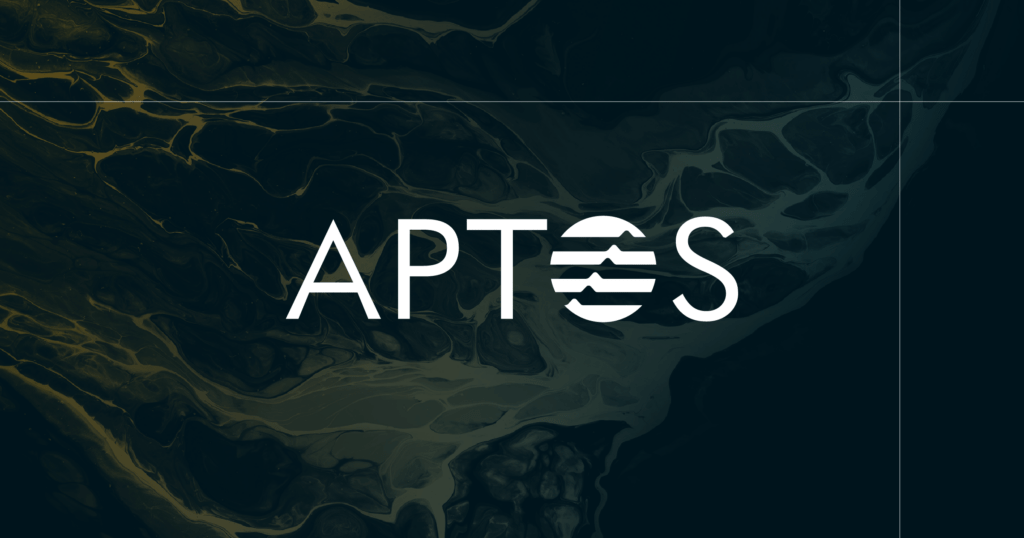Latest News
- Aptos Proposal Aims to Reduce Staking Yields for Economic Adjustment
- Altcoins and Meme Tokens Seek Spot ETF Approval Amid Growing Interest
- New Aptos Governance Plan Proposes Halving Staking Rewards to Curb Network Inflation
- Aptos Community Proposes 50% Cut in Staking Rewards : What’s Next for the Network?
Current Price
The current price of APT is $5.16365
Introduction
Welcome to our Aptos review.
Aptos (APT) is a compelling case as a Layer 1 blockchain, engineered to address the pressing challenges of scalability and security in decentralized applications.
With its foundation laid by former Meta engineers and the adoption of the AptosBFT consensus algorithm, Aptos aims to deliver significant improvements in transaction throughput and latency.
As its ecosystem burgeons, encompassing diverse applications from decentralized finance to NFTs, questions arise regarding its position amidst established competitors and the robustness of its security measures.
These considerations prompt a closer examination of Aptos’s future trajectory and potential impact on the blockchain landscape.
Ready to learn more? Continue reading this review to get a better understanding of Aptos.
Quick Overview
- Aptos is a Layer 1 blockchain launched in 2022, designed for high scalability, security, and usability in decentralized applications (dApps).
- The AptosBFT consensus algorithm enables parallel transaction processing, achieving thousands of transactions per second with low latency.
- The Move programming language enhances resource management and safety for smart contract execution, contributing to a secure development environment.
- Aptos supports diverse use cases, including decentralized finance (DeFi), non-fungible tokens (NFTs), and enterprise solutions, fostering a vibrant ecosystem.
- The tokenomics of APT includes a capped supply of 1 billion tokens, promoting deflationary mechanisms and community participation through governance and staking rewards.
Overview of Aptos
Here is a great overview video about Aptos protocol:
Providing a thorough understanding of Aptos (APT) requires examining its foundational principles and technological innovations. Launched in 2022, Aptos is a Layer 1 blockchain designed to enhance the scalability, security, and usability of decentralized applications (dApps). Its development stems from research conducted by former Meta (Facebook) engineers, particularly those involved with the Diem blockchain project, which emphasizes a robust framework for building secure and efficient blockchain solutions.
At its core, Aptos utilizes a unique consensus algorithm known as AptosBFT, which combines Byzantine Fault Tolerance with a parallel execution engine. This guarantees that transactions can be processed simultaneously, greatly increasing throughput while maintaining integrity.
Additionally, Aptos employs a programming language called Move, which focuses on resource management and safety, thereby reducing vulnerabilities often associated with smart contracts.
The platform seeks to address the limitations of existing blockchains by prioritizing user experience and providing developers with powerful tools for creating dApps. By emphasizing modularity and interoperability, Aptos aims to support a diverse ecosystem that fosters innovation and adoption within the rapidly evolving blockchain landscape.
Understanding these foundational elements is essential for appreciating Aptos’s potential impact on the broader digital economy.
Key Features of Aptos
Aptos showcases a remarkable blend of innovation and functionality, setting it apart in the competitive landscape of blockchain technology. One of its key features is its focus on high throughput and low latency, enabling the processing of thousands of transactions per second. This capacity enhances user experience and supports a wide array of decentralized applications (dApps) without compromising performance.
Another significant attribute of Aptos is its modular architecture, which allows for efficient upgrades and customization. This design facilitates the integration of new features and performance improvements without disrupting existing operations, thereby ensuring long-term sustainability and adaptability.
Additionally, Aptos emphasizes security through its advanced consensus mechanism, which mitigates potential vulnerabilities commonly associated with blockchain networks. The platform incorporates robust cryptographic techniques that safeguard user assets while maintaining transparency.
Moreover, Aptos fosters a developer-friendly environment, providing extensive tools and resources that simplify the creation of dApps. This commitment to usability encourages innovation and attracts a diverse range of developers to the ecosystem.

Technology Behind Aptos
Aptos is built on a Layer 1 blockchain architecture, which allows for high throughput and low latency, addressing scalability challenges faced by earlier blockchain systems.
Central to its functionality is the Move programming language, designed specifically for secure and efficient smart contract execution.
Together, these technologies position Aptos as a significant player in the evolving blockchain landscape.
Layer 1 Blockchain Architecture
The underlying architecture of Aptos represents a notable advancement in layer 1 blockchain technology, designed to enhance scalability, security, and user experience. At its core, Aptos utilizes a modular framework that separates consensus and execution layers, allowing for parallel transaction processing. This approach considerably increases throughput, enabling the network to handle thousands of transactions per second while minimizing latency.
Furthermore, Aptos incorporates a unique consensus mechanism known as AptosBFT, which optimizes for both speed and finality. This Byzantine Fault Tolerant protocol guarantees that the network remains resilient, even in the presence of malicious actors, thereby bolstering security.
Additionally, the architecture emphasizes user experience through features such as seamless upgrades and backward compatibility, which facilitate the integration of new functionalities without disrupting existing services.
Aptos also prioritizes developer accessibility by offering extensive tools and resources, streamlining the development process for decentralized applications (dApps). This holistic approach to blockchain architecture not only addresses common limitations faced by earlier platforms but also lays a robust foundation for future innovations within the ecosystem.
As a result, Aptos positions itself as a formidable contender in the rapidly evolving landscape of blockchain technology.

Move Programming Language
At the heart of Aptos lies the Move programming language, a significant innovation designed to enhance the development of secure and efficient smart contracts. Originating from Facebook’s Diem project, Move is specifically tailored for blockchain applications, prioritizing safety and flexibility. Its unique resource-oriented model enables developers to manage digital assets more effectively, ensuring that assets cannot be duplicated or lost inadvertently.
Move’s design includes a strong type system and formal verification capabilities, which help in identifying potential vulnerabilities during the development process. This is particularly essential in the blockchain space, where security breaches can lead to significant financial losses. Additionally, the language allows for the creation of custom types and modules, facilitating a wide range of applications beyond simple transactions.
Moreover, Move’s execution environment is optimized for performance, enabling faster transaction processing and reduced latency. This efficiency is vital for supporting the high throughput capabilities that Aptos aims to deliver.
Aptos Ecosystem and Use Cases
Exploring the Aptos ecosystem reveals a robust and versatile framework designed to support a wide range of decentralized applications (dApps) and services. At its core, Aptos leverages the Move programming language, enabling developers to create secure, high-performance applications that can function across various sectors, including finance, gaming, and supply chain management.
One of the prominent use cases within the Aptos ecosystem is decentralized finance (DeFi), where users can engage in trading, lending, and yield farming without intermediaries. This is facilitated by Aptos’s scalability and low transaction costs, which enhance user experience and foster mass adoption.
Additionally, the ecosystem supports non-fungible tokens (NFTs), allowing artists and creators to tokenize their work and connect with global audiences. The integration of NFT marketplaces within Aptos provides a platform for seamless transactions and ownership verification.
Moreover, Aptos aims to enhance enterprise solutions, offering businesses a blockchain infrastructure that prioritizes security and efficiency.
As the ecosystem continues to evolve, its diverse use cases and adaptability position Aptos as a significant player in the blockchain landscape.

Comparison With Other Blockchains
In comparing Aptos with other blockchains, key factors such as scalability, performance, and security features emerge as critical differentiators.
Aptos aims to address scalability concerns through its innovative consensus mechanism, which may offer advantages over traditional blockchains.
Additionally, a thorough evaluation of its security protocols in relation to competitors highlights the platform’s commitment to maintaining robust protection against vulnerabilities.
Scalability and Performance
Many blockchain networks face considerable challenges related to scalability and performance, making Aptos (APT) an intriguing case study. Aptos employs a unique architecture designed to enhance transaction throughput and reduce latency, distinguishing it from traditional blockchains like Ethereum and Bitcoin, which often grapple with congestion during peak usage.
By utilizing a parallel execution model, Aptos can process multiple transactions simultaneously, greatly increasing its capacity to handle high volumes of decentralized applications (dApps) and user interactions.
In comparison, many existing networks resort to layer-two solutions or sharding to improve scalability, which can introduce complexity and potential security risks. Aptos, with its focus on a robust base layer, aims to maintain security while achieving higher performance metrics.
Additionally, Aptos employs a novel consensus mechanism that optimizes block production times and minimizes transaction finality delays, positioning itself as a competitive alternative in the blockchain ecosystem.
While Aptos showcases impressive scalability and performance, it is essential to evaluate how its innovative features will fare in real-world applications and against the evolving landscape of blockchain technology.
Ongoing developments and community adoption will ultimately determine the effectiveness of Aptos in addressing these critical issues.
Security Features Comparison
When evaluating the security features of Aptos (APT) in relation to other blockchain networks, it becomes evident that its architecture is designed with a focus on robust security measures. Aptos employs a unique consensus mechanism known as AptosBFT, which enhances resilience against various attack vectors, including Sybil attacks and double-spending. This consensus model prioritizes fault tolerance, enabling the network to maintain integrity even in adversarial conditions.
In comparison, traditional blockchains like Bitcoin rely on Proof of Work, which, while secure, faces criticisms regarding energy consumption and scalability. Ethereum, progressing to Proof of Stake, offers improved energy efficiency but still grapples with security concerns related to validator centralization.
Aptos, on the other hand, integrates secure programming languages and modules that facilitate safer smart contract execution, reducing the potential for vulnerabilities commonly exploited in other ecosystems.
Moreover, Aptos implements a layered security approach, combining cryptographic techniques and thorough auditing, which stands in contrast to the more monolithic structures of older blockchains. Consequently, Aptos positions itself as a formidable contender in the blockchain space, prioritizing both security and performance in its design philosophy.

Tokenomics of APT
The tokenomics of Aptos (APT) plays an essential role in understanding its value proposition and ecosystem dynamics. At the core of Aptos is a supply mechanism that emphasizes scarcity and utility. The total supply of APT tokens is capped at 1 billion, which is designed to create a deflationary environment over time. This cap is critical for maintaining the token’s value as demand increases along with the adoption of the Aptos network.
Token distribution is also significant, with allocations directed towards various stakeholders, including developers, investors, and community initiatives. Approximately 51% of tokens are allocated to the community, which encourages participation and fosters a robust ecosystem. The allocation strategy aims to incentivize long-term commitment to the platform.
Moreover, APT tokens serve multiple functions within the Aptos ecosystem, including governance, transaction fees, and staking rewards. This multipurpose nature enhances user engagement and aligns the interests of different stakeholders.
The economic model is designed to promote stability and encourage growth, making Aptos a compelling candidate for users and developers alike. Overall, the tokenomics structure of APT reflects a well-thought-out approach to fostering a sustainable blockchain ecosystem.
Security Measures in Aptos
Building upon the robust tokenomics of Aptos (APT), the platform also prioritizes security measures to safeguard its ecosystem and users’ assets. The Aptos blockchain employs a multi-layered security architecture designed to address various vulnerabilities inherent in decentralized systems. At its core, Aptos utilizes a Byzantine Fault Tolerance (BFT) consensus mechanism, which enhances resilience against malicious attacks while ensuring transaction finality.
Additionally, Aptos incorporates formal verification methods, enabling developers to mathematically prove the correctness of smart contracts before deployment. This proactive approach mitigates risks associated with bugs and vulnerabilities that could be exploited by malicious actors. The platform also emphasizes the importance of user education and awareness, providing resources to help users understand best practices for securing their assets.
Moreover, Aptos employs advanced cryptographic techniques, such as zero-knowledge proofs, to enhance privacy and security during transactions. Regular security audits and community bug bounty programs further reinforce the platform’s integrity, encouraging external scrutiny and the identification of potential weaknesses.
Collectively, these measures reflect Aptos’s commitment to maintaining a secure environment, fostering user trust and confidence in its burgeoning ecosystem.
Community and Development Support
Aptos (APT) has cultivated a vibrant community and development support ecosystem that plays an essential role in its ongoing growth and innovation. This community is characterized by active participation from developers, investors, and users, creating a collaborative environment conducive to knowledge sharing and problem-solving.
With a focus on transparency and inclusivity, Aptos encourages contributions from diverse stakeholders, enhancing its overall resilience and adaptability. The development support infrastructure includes extensive resources such as documentation, tutorials, and forums, which empower both novice and experienced developers to engage with the platform effectively.
Additionally, Aptos has established partnerships with various organizations and projects, fostering an interconnected network that enhances its technological capabilities and outreach.
Moreover, the community’s involvement in governance mechanisms allows for decentralized decision-making, ensuring that the platform evolves in alignment with user needs and preferences. This democratic approach not only strengthens community trust but also stimulates further innovation.
Recent Developments and Updates
Recent advancements in the Aptos ecosystem highlight its commitment to continuous improvement and innovation. The platform has made significant strides in enhancing its scalability and transaction throughput, aiming to accommodate a growing user base and increased demand for decentralized applications (dApps). In recent updates, the introduction of Layer 2 solutions has shown promise in reducing latency and transaction costs, thereby improving overall user experience.
Moreover, Aptos has prioritized developer engagement through the launch of extensive documentation and developer toolkits. These resources facilitate easier onboarding for developers, fostering a more vibrant ecosystem of applications.
In addition, partnerships with various blockchain projects and integration with popular decentralized finance (DeFi) protocols reflect Aptos’s strategic efforts to enhance interoperability within the broader blockchain landscape.
Security has also been a focal point, with the implementation of rigorous auditing processes and updates to its consensus mechanism to guarantee robust protection against vulnerabilities.
The Aptos team remains proactive in addressing community feedback, exemplifying a responsive approach to development that aligns with user needs. Collectively, these recent developments position Aptos as a competitive player in the blockchain space, reinforcing its commitment to innovation and user-centric solutions.
Future Prospects of Aptos
As the blockchain landscape continues to evolve, the future prospects of Aptos appear promising, driven by its innovative technological foundations and strategic initiatives. Aptos leverages a unique consensus mechanism and programming language, which enhances scalability and security, setting it apart from other blockchain platforms. This innovation addresses critical challenges faced by existing blockchains, particularly in transaction speed and operational efficiency.
The platform’s commitment to developer engagement is another significant factor influencing its future. By fostering a robust ecosystem through grants, educational initiatives, and partnerships, Aptos is positioning itself as a preferred choice for developers seeking to create decentralized applications (dApps). This strategic focus on developer relations will likely translate into a diverse range of applications, enhancing the platform’s utility and adoption.
Moreover, the growing interest in decentralized finance (DeFi) and non-fungible tokens (NFTs) could further bolster Aptos’ relevance in the market. As these sectors expand, Aptos’ infrastructure may attract projects looking for a scalable and user-friendly environment.
Frequently Asked Questions
How Can I Buy Aptos (Apt) Tokens?
To purchase tokens, first select a reputable cryptocurrency exchange that lists them. Create an account, complete necessary verification, deposit funds, and place an order for the desired amount of tokens, ensuring to follow security protocols.
What Wallets Support Aptos (Apt) Storage?
Numerous wallets support Aptos (APT) token storage, including popular options such as Petra Wallet, Martian Wallet, and the Aptos Wallet. These wallets provide secure storage and facilitate transactions within the Aptos ecosystem, enhancing user experience.
Is Aptos (Apt) Available on Major Exchanges?
Aptos (APT) is indeed available on several major cryptocurrency exchanges, enhancing its accessibility to traders and investors. This availability is essential for fostering liquidity and adoption within the growing decentralized finance ecosystem.
What Are the Tax Implications of Trading Aptos (Apt)?
Trading cryptocurrencies typically incurs capital gains taxes, with implications varying by jurisdiction. Investors should track transaction records meticulously to determine profit or loss, ensuring compliance with local tax regulations and maintaining accurate reporting for tax purposes.
How Can I Participate in the Aptos Community?
To participate in a cryptocurrency community, engage through official forums, social media channels, and local meetups. Contributing to discussions, sharing insights, and collaborating on projects can enhance your involvement and foster connections within the community.
Wrapping Up
Aptos (APT) aims to deliver a tech stack that could prove to be a significant advancement in blockchain technology, characterized by its unique consensus mechanism and programming language.
The platform’s focus on scalability, security, and usability positions it favorably within the competitive landscape of decentralized applications.
With a growing ecosystem and robust community support, Aptos is well-equipped to address the evolving needs of developers and users.
The exploration of its future prospects indicates potential for further innovation and adoption in the decentralized finance and NFT sectors.

